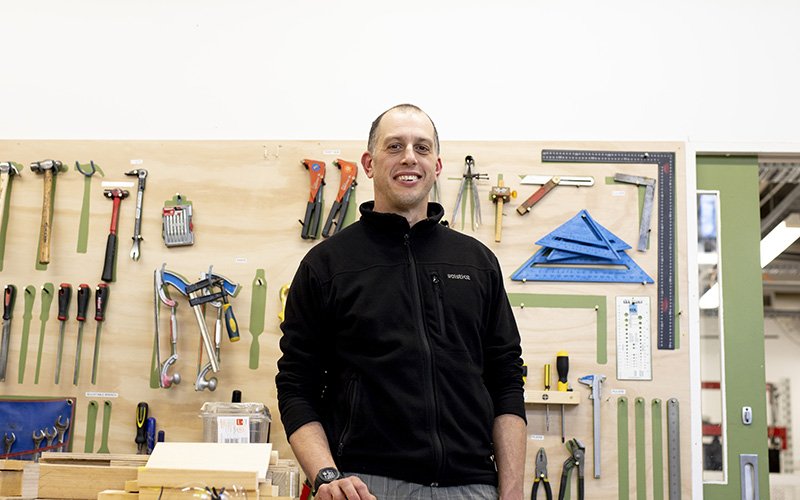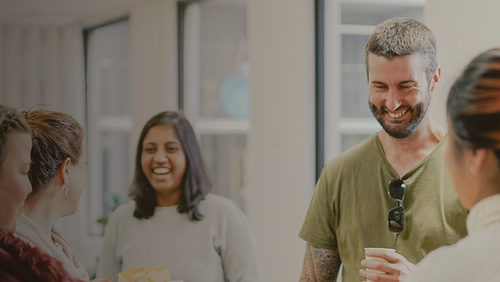15 Jun 2023
Adam Liberatore is a Senior Lecturer in engineering at Otago Polytechnic. We learnt about Adam’s role, extensive career and what inspired him to enter the world of academia.
What is your role at Otago Polytechnic?
Senior lecturer in engineering. I’m a mechanical engineer by education and career in product development but depending on the semester, I’ll teach students in all three of the engineering streams, civil, electrical, and mechanical. On the mechanical engineering team, I focus a lot on CAD (AutoCAD and SolidWorks) and project courses but also teach Material Science, Computing, Manufacturing Processes as well.
Why did you enter the world of academia?
My professional career has seen me move around a lot. Every 2-3 years I have found different pastures to practice my product development skills along changing geographical locations. Four years ago, I had that same itch again and had already been teaching CAD one day a week. I wanted to try it full time, and this is now my fourth-year teaching. Academia works well for my brain as I have to juggle different course concepts over the course of the semester but also have to be able to shift those focuses each semester. Having to learn civil engineering has been a new and interesting challenge for me. Another challenge is learning how to do academic research. And the summer holiday is epic too!
What’s the best thing about teaching engineering to students?
Seeing how the students develop from the first courses to how the solve their capstone project. Now some of the students I have taught are in industry, so it is great to see how they are impacting on the local engineering industry.
What three tips would give all engineering students, regardless of the discipline they are studying?
Network, be curious and give it a go.
Networking for me has been one of the most important skills I have needed. Especially since I have change jobs and locations so often, meeting people help land your next position. It’s funny how often the person you meet knows someone who knows someone that needs help. Always interesting to learn what people’s passions are and what they do.
Staying curious is a great way to be at the leading edge of your industry. The more questions you ask, the deeper your knowledge will go. The better you will be able to figure out complex problem. Inspiration can come from anywhere.
Give it a go. Failure is part of the process. The sooner you can get something tested, the sooner learn what will work. The initial step is hardest and even the most complex systems have small easy problems to start on.

Adam Liberatore in his workshop. Photo: Taken by Shane Gilchrist.
What skills do you think engineering students need, so they are equipped for the workforce?
Communication and curiosity. Being an effective communicator is very important to sell your idea to management, client, or customer. Curiosity and being able to ask a good question will allow them to always stay on top of new technology and developments.
Finish the sentence, 'a world without engineers would be…'
Boring. Everything that is made has been modified by an many engineers.
Why are you a member of Engineering New Zealand?
To easily connect with industry and drive engineering forward. As engineers, we are not great at promoting our accomplishments and our importance to society. Trying to improve this to convince more kids to pursue engineering is important. I just started volunteering with the Wonder Project which has been great to see the excitement and engagement of Year 5/6 students asking questions and solving problems. Blasting rockets into the air is a good conclusion too.
What’s your favourite piece of engineering in Dunedin?
The beach. More a natural wonder but Dunedin is the first time I’ve lived on the coast. It always amazes me how the water/land interface changes so much and so drastically day to day. The constant force and shifting of sand is interesting to see. On top of that, the human resources we place right next to this interface and how we try and engineer structures to withstand this constant change.
What do you do in your spare time?
Family duties chasing around two active boys, Elliot 5, and Milo 10. Getting outside and exploring Ōtepoti and the South Island. I also try get on local mountain biking tracks as well as playing some ultimate frisbee with the University of Otago team. I also enjoy coffee, eating chocolate chip cookies, and naps.
This interview originally featured in our Academic newsletter, Teach.





